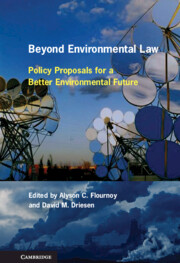Book contents
- Frontmatter
- Contents
- List of Figure and Tables
- About the Contributors
- Preface
- Acknowledgments
- Part I National Environmental Legacy Act
- 1 The Case for the National Environmental Legacy Act
- 2 The Necessity of Procedural Reform
- 3 Shifting Baselines and Backsliding Benchmarks: The Need for the National Environmental Legacy Act to Address the Ecologies of Restoration, Resilience, and Reconciliation
- 4 Valuing Nature: The Challenge of the National Environmental Legacy Act
- 5 Citizen Science and the Next Generation of Environmental Law
- 6 Creating National Environmental Legacy Act Information: The Double Standard
- 7 The Constitution and Our Debt to the Future
- Part II Environmental Competition Statute
- Index
- References
2 - The Necessity of Procedural Reform
Published online by Cambridge University Press: 05 June 2012
- Frontmatter
- Contents
- List of Figure and Tables
- About the Contributors
- Preface
- Acknowledgments
- Part I National Environmental Legacy Act
- 1 The Case for the National Environmental Legacy Act
- 2 The Necessity of Procedural Reform
- 3 Shifting Baselines and Backsliding Benchmarks: The Need for the National Environmental Legacy Act to Address the Ecologies of Restoration, Resilience, and Reconciliation
- 4 Valuing Nature: The Challenge of the National Environmental Legacy Act
- 5 Citizen Science and the Next Generation of Environmental Law
- 6 Creating National Environmental Legacy Act Information: The Double Standard
- 7 The Constitution and Our Debt to the Future
- Part II Environmental Competition Statute
- Index
- References
Summary
“IF YOU LET ME WRITE PROCEDURE AND I LET YOU WRITE substance,” Congressman John Dingell once observed, “I'll screw you every time.” The environmental movement in the 1960s was well aware of the important connection between legal procedure and the successful implementation of the environmental statutes. These activists convinced the courts to adopt a series of reforms that made agencies such as the Environmental Protection Agency (EPA) more accountable for failing to implement a statutory mandate. More recently, the Supreme Court has made it more difficult for environmental advocacy groups to perform this role. If the National Environmental Legacy Act (hereafter, “the Act”) is to achieve its objectives, Congress should consider how administrative procedure will affect its substantive objectives. Although substantive reform is important, as Representative Dingell reminds us, so is procedural reform.
Procedure and Substance
Environmental and consumer activists in the 1960s and 1970s were concerned that the basic procedural framework used by agencies was insufficient for ensuring that the many new environmental and consumer laws enacted during the period would be implemented effectively. This concern was based in part on a series of widely publicized reports that identified overly cozy relationships between regulators and regulatees as a primary reason for the faltering performance of older regulatory agencies, such as the Federal Trade Commission (FTC). Reformers attributed this capture in part to the way in which the courts had interpreted the Administrative Procedure Act (APA).
- Type
- Chapter
- Information
- Beyond Environmental LawPolicy Proposals for a Better Environmental Future, pp. 37 - 52Publisher: Cambridge University PressPrint publication year: 2010



